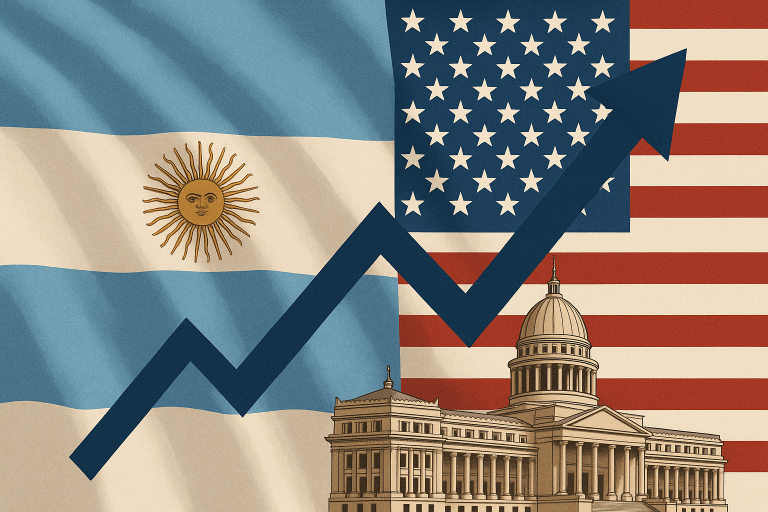Argentina’s President Javier Milei has strengthened his grip on power after his party, La Libertad Avanza, won the country’s midterm elections — a result that not only consolidates his austerity-driven economic agenda but also highlights the growing influence of the United States in Argentina’s financial future.
The election, seen as a referendum on nearly two years of Milei’s libertarian rule, came amid a $40 billion bailout deal announced by the US administration.
The financial lifeline, linked closely to Milei’s political performance, has drawn global attention for its size and its implications for Latin America’s balance of power.
What happened in Argentina’s midterm elections
With more than 95% of ballots counted, Milei’s La Libertad Avanza secured 40.84% of the nationwide vote, while the Peronist opposition, Fuerza Patria, trailed with 31.67%.
The result was stronger than expected for Milei’s government, which had downplayed expectations after losing provincial elections in Buenos Aires last month.
This victory allows Milei’s party to maintain a one-third share in the lower house and 12 seats in the Senate, ensuring that his presidential vetoes cannot be overturned by the opposition.
Buenos Aires province — home to almost 40% of the electorate and historically a Peronist stronghold — also shifted in Milei’s favour.
Turnout stood at 67.85%, the lowest since Argentina’s return to democracy in 1983. Experts say this reflected both voter fatigue and discontent over austerity, as the country struggles with rising unemployment and falling purchasing power.
The $40bn bailout and Washington’s growing role
The election’s global significance lies in Washington’s involvement.
US President Donald Trump announced a $40 billion bailout package to support Argentina’s fragile economy — an unprecedented intervention that tied continued financial aid to Milei’s electoral success.
The package includes a $20 billion currency swap with Argentina’s central bank and an additional $20 billion loan from private US institutions.
This came on top of the $20 billion International Monetary Fund loan already extended to Buenos Aires, of which $14 billion has been disbursed.
On X (formerly Twitter), US Treasury Secretary Scott Bessent had posted, “Under President Milei, Argentina has taken important strides toward stabilisation…” — a statement widely seen as a signal of Washington’s confidence in Milei’s reform agenda.
The US assistance helped the Milei administration stabilise the peso after months of depletion in foreign reserves. But it also underscored how Argentina’s economic recovery now depends heavily on Washington’s confidence.
Experts say the arrangement effectively positions Argentina as a key testing ground for Trump’s regional strategy, blending financial leverage with ideological alignment.
Inside Milei’s austerity reforms
Since assuming office in 2023, Milei has implemented what he calls his “chainsaw” plan — a drastic programme of spending cuts aimed at reducing the fiscal deficit.
The measures included slashing tens of thousands of public jobs, freezing infrastructure and healthcare investments, and limiting subsidies for pensioners.
These actions have had a measurable impact: inflation has fallen from more than 200% in 2023 to about 30% by September 2025, marking Argentina’s first fiscal surplus in 14 years.
Economic activity grew 0.3% in August after three months of decline.
However, the social cost has been severe. Over 250,000 jobs have been lost, about 18,000 businesses have closed, and purchasing power continues to drop.
Meanwhile, corruption allegations involving Milei’s sister and questions over campaign financing have tested public trust.
Despite this, many Argentinians continue to support the government’s efforts to stabilise an economy long plagued by inflation and mismanagement.
Why the US connection matters
Washington’s financial backing has reshaped how global investors view Argentina. The Trump administration’s $40 billion package is the largest single US bailout for any Latin American country in modern history.
Analysts say it has effectively made Argentina the centrepiece of a new economic alliance modelled on free-market reforms and fiscal discipline.
For Milei, the backing provides political legitimacy and breathing room to continue his economic experiment.
For Trump, it demonstrates the US’s renewed strategic interest in Latin America at a time when Chinese and Russian economic influence in the region has expanded.
Yet the deeper question for Argentina remains whether this partnership can produce sustainable growth. While inflation is easing and markets have stabilised, poverty and inequality are rising.
The success of Milei’s reforms — and by extension, Washington’s financial gamble — depends on whether austerity can coexist with social stability.
The post Argentina midterm election: Javier Milei strengthens power with US $40B support appeared first on Invezz

